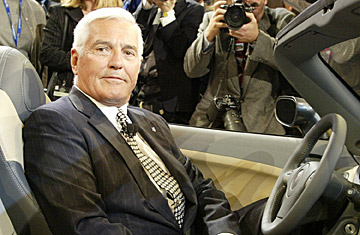
Former vice chairman of the Chrysler Corporation, Bob Lutz
(7 of 11)
NORMAN PEARLSTINE: Well, I think Milken has— that there are two parts to him and probably two lists you can put him on.
There is no doubt that he was able to create capital that allowed a large number of companies that we now think of as secure parts of our corporate landscape to exist from MCI to—
GERALDINE LAYBOURNE: Turner Broadcasting.
NORMAN PEARLSTINE: —CNN and Turner Broadcast. You know, just a tremendous number of companies that he had great influence over.
On the other hand, he did plead guilty to six counts of what are known as felonies and did do time and that will always be a part of his legacy as a builder and titan.
GERALDINE LAYBOURNE: What he's doing now is interesting.
WALTER ISAACSON: In education?
GERALDINE LAYBOURNE: He's dedicating his brain-power to figuring out the issues that face us, the very severe issues that face us in education.
NORMAN PEARLSTINE: And in his cancer cure.
WALTER ISAACSON: His medical— his medical—
DARLA MOORE: Yeah, but the only reason he was in that mode is because he's not able to be in his capital-allocating, capital-building mode. But I would say he is one of the great financial figures, up there with J.P. Morgan, of the 20th century.
GERALDINE LAYBOURNE: Right.
DARLA MOORE: Because he opened capital to, as Norman said, an entirely different arena of entrepreneur than had ever been able to access capital before.
WALTER ISAACSON: Well, we didn't do John Feinstein, financing. The other way to do it is a venture capitalist, say, which is a relatively new breed of animal in the past 20, 30 years.
You're one of 'em. But let me ask for the sake of argument. Who's more important? Take Arthur Rock, on one hand, who raised all the capital for Intel and Apple and others, or Steve Jobs, who came up with the notion for it, or Gordon Moore, who came up with the notion of the microprocessor at Intel.
DARLA MOORE: Well, you know the answer you're going to get from me to the question.
GERALDINE LAYBOURNE: And you know the answer you're gonna get from me.
WALTER ISAACSON: And I'm ready for both.
DARLA MOORE: And he can— they're gonna give you the other side of the answer.
WALTER ISAACSON: Go for it.
DARLA MOORE: Arthur Rock, who is considered the father of venture capital, and another distinction we need to look at— There is no place on earth that give the benefit to new ideas like we do in finance — new ideas.
WALTER ISAACSON: Why?
DARLA MOORE: It's extraordinary.
WALTER ISAACSON: Is it venture capital?
DARLA MOORE: In the venture capital.
That we finance— we will put money behind— we're individualistic. We are creative people. We are, you know, egalitarian people. It's a whole part of the national culture and the national character of Americans that we would ultimately do this type of thing.
But there's nowhere else on the earth that you can get this kind of money to back two long-haired, sneaker-wearing' dirty kids.
WALTER ISAACSON: I think we're talking about Steve Jobs and Wozniak at Apple, right?
DARLA MOORE: Who in the world—
NORMAN PEARLSTINE: Talk about a lot 'em?
WALTER ISAACSON: We're getting into technology, here. OK? So—
DARLA MOORE: And Arthur Rock was the epitome of white-shoed, moneyed, Harvard-educated elegant man. And these two come to him.
WALTER ISAACSON: Yeah?
DARLA MOORE: And with their ideas.
And— he supported—
WALTER ISAACSON: You think it was the venture capitalist. And you say it was him who made it work—
DARLA MOORE: He supported. He identified. He had the money. He was in the East. The ideas were in the West. And that was what created Silicon Valley.
He had the insight to see the talent, recognize the talent and also what they had created — the idea.
Like I said — it's ideas, it's stewardship, and it's allocation of capital.
WALTER ISAACSON: But you're putting it in a different order with the allocation of capital being one of the most important things.
DARLA MOORE: I believe that is the first—
WALTER ISAACSON: Geraldine?
GERALDINE LAYBOURNE: Well, I come from the vision side of things. And, although I think capital is incredibly important and obviously they never would have gotten a break if it hadn't been for a very venturesome man.
But the essential idea that Steven Jobs came up with, which everybody at the time thought was just completely crazy — the idea that there would be anything like a personal computer — and then to figure out that you had to really had to really come at it from a consumer point of view, that you couldn't just build-it-and-they-will-come but you had to spend a lot of time figuring out how to get consumers pleased by this new technology so that they would drive the taking up of personal computers all over the place.
And he also had a personal philosophy about how you manage a creative process, which I think will be a model for years to come. I think he's really visionary for the 21st century.
